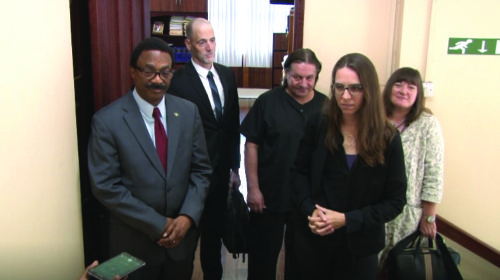
As there continues to be uncertainty surrounding when elections will be held in Guyana, a team of officials from the United States-based Carter Center is in Guyana to get perspective on the situation.
The first set of meetings was held with Attorney General Basil Williams on Wednesday.
The two-hour meeting was held at the Attorney General’s Office on Carmichael Street.
Following the meeting, Carter Center’s Associate Democracy Programme Director Brett Lacy told reporters that the organisation is trying to get the various perspectives of the current situation.
“I can say from the Carter Center, we are really just here to listen and we are hoping to meet with different actors to understand everyone’s perspective on current events here in Guyana,” Lacy said.
Meanwhile, AG Basil Williams told media operatives at the press conference afterwards that he shared the Government’s position with the Carter Center team.
This includes that the Government is awaiting the decision of the appeal filed on the Chief Justice’s ruling on the House-to-House Registration exercise.
“We’re waiting on GECOM to be ready too to announce elections date, dissolve Parliament and move to elections… I think the Carter Center, of course as they’ve always been, they’re interested in the rule of law prevailing; and that in the way we’re situated now, that we take advantage of our situation and enable all the people of our country to benefit from it,” Williams asserted.
The other representatives from the US-based organisation are: Legal Analyst Anne Marlborough, Political and Electoral Analyst Nicoholas Jahr, and Senior Electoral Advisor Carlos Valenzuela.
In March, another Carter Center delegation, led by Jason Carter, the grandson of former US President Jimmy Carter, visited Guyana and met with local political stakeholders. In fact, after a meeting with the Guyana Elections Commission (GECOM) at the time, the younger Carter posited that there was a lot of political desire to reach a solution but noted this will have to be done by the political leaders.
“Ultimately, our role here, of course, is limited. We are not Guyanese, we care about this country… But ultimately, the issues that are being confronted right now are going to require the cooperation of the political leadership of this country and we are optimistic…” Carter had stated back in March.
But even as the US-based delegation continues to engage local political stakeholders, there appears to be a gridlock as to when elections will be held. In fact, discussions in this regard are still ongoing at GECOM.
Elections were constitutionally due since March 21, 2019 – following the passage of the December 2018 No-Confidence Motion against the current government. However, with the legal challenges which ensued, that timeline was on pause but was subsequently reinstated after the July 18, 2019 Caribbean Court of Justice (CCJ) ruling, which validated the passage of the motion.
Against this backdrop, the Opposition was pushing for a September 18, 2019 polling day. President Granger has kept claiming that he cannot set a date without first being advised by GECOM on its preparedness to host General and Regional Elections.
GECOM had come under heavy criticism for also deliberately delaying the elections by going ahead with the controversial House-to-House Registration. The constitutionality of this exercise was challenged in court. In fact, acting Chief Justice Roxane George last month ruled that the conduct of House-to-House registration is not unconstitutional or illegal. However, she noted that GECOM cannot operate as it would in a normal elections cycle. Given that the NCM triggered early elections, the Chief Justice had stated that there are other methods that can be used to sanitise the voters’ list in a timely manner, such as Claims and Objections.
She had also ruled that it would be unconstitutional for the Commission to remove qualified persons already on the voters’ list, since the House-to-House exercise was aimed at creating a new National Register of Registrants (NRR) Database, which the Opposition said would have disenfranchised thousands of Guyanese.
Nevertheless, the Elections Commission has since scrapped the House-to-House Registration, which had recorded over 300,000 new registrants and is looking to merge the new data obtained with the existing NRR database – something which the Opposition is against.
Opposition Leader Bharrat Jagdeo insists that there should be polls long before the end of 2020 and made a case for this when he met with the Elections Commission on Tuesday.
At that meeting, the Opposition was assured that elections will be held before the end of the year.



